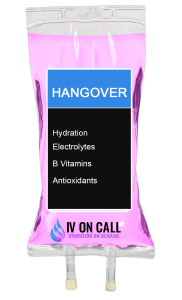This IV infusion, often marketed as a "Hangover Cure" or "Hangover Relief" treatment, combines hydration solution, electrolytes, B vitamins, and antioxidants. It's promoted to alleviate symptoms associated with alcohol overconsumption, such as dehydration, electrolyte imbalance, and general malaise. While these components address some physiological effects of alcohol, the efficacy and necessity of administering them intravenously for hangover relief are subjects of ongoing debate in the medical community.

1. Hydration Solution
- Function: Replenishes lost fluids
- Typical IV solution: Normal saline (0.9% sodium chloride) or Lactated Ringer's solution
- Considerations:
- Rapidly rehydrates the body
- Volume typically ranges from 500ml to 1L, depending on individual needs
2. Electrolytes
May include:
a. Sodium and Chloride
- Function: Maintain fluid balance and support nerve function
- Considerations:
- Already present in the hydration solution
- Levels must be carefully balanced
b. Potassium
- Function: Essential for heart, muscle, and nerve function
- Typical IV dose: 20-40 mEq/L of fluid
- Considerations:
- Helps counteract electrolyte imbalance caused by alcohol's diuretic effect
- Must be administered carefully to avoid cardiac risks
c. Magnesium
- Function: Supports muscle and nerve function, may help with headaches
- Typical IV dose: 1-2g
- Considerations:
- May help alleviate hangover symptoms like headache and muscle cramps
- High doses can cause hypotension
3. B Vitamins
Often includes:
a. Vitamin B1 (Thiamine)
- Function: Essential for glucose metabolism
- Typical IV dose: 100mg
- Considerations:
- Important for preventing Wernicke's encephalopathy in chronic alcohol users
b. Vitamin B6 (Pyridoxine)
- Function: Involved in amino acid metabolism
- Typical IV dose: 50-100mg
- Considerations:
- May help with nausea
c. Vitamin B12 (Cobalamin)
- Function: Essential for nerve function and DNA synthesis
- Typical IV dose: 1000mcg
- Considerations:
- May help with fatigue, but evidence for hangover relief is limited
4. Antioxidants
May include:
a. Vitamin C
- Function: Powerful antioxidant
- Typical IV dose: 500-1000mg
- Considerations:
- May help combat oxidative stress induced by alcohol metabolism
b. Glutathione
- Function: Master antioxidant, supports liver function
- Typical IV dose: 500-1000mg
- Considerations:
- May support the liver in processing alcohol byproducts
- Effectiveness of IV versus oral administration is debated
- Rapid rehydration
- Electrolyte rebalancing
- Reduction of hangover symptoms (headache, nausea, fatigue)
- Support for liver function
- Replenishment of vitamins depleted by alcohol consumption
- Typically administered in medical clinics, mobile IV services, or by healthcare providers
- Usually given as an IV drip over 30-60 minutes
- Generally used as a one-time treatment in response to hangover symptoms
- Efficacy:
- While individual components address some physiological effects of alcohol consumption, evidence for the efficacy of this specific IV combination in treating hangovers is limited
- Most studies on hangover treatments show mixed results
- Safety concerns:
- Risk of infection at injection site or in bloodstream
- Potential for allergic reactions
- Possibility of vein irritation or damage
- Risk of fluid overload in susceptible individuals
- Interactions and Contraindications:
- May interact with certain medications
- Not suitable for individuals with certain medical conditions, particularly kidney or heart issues
- Caution needed in individuals with liver disease or those at risk for Wernicke's encephalopathy
- Oral hydration with water and electrolyte solutions
- Over-the-counter pain relievers (used cautiously due to potential liver effects)
- Rest and sleep
- Light, easily digestible foods
- Time (most hangover symptoms resolve within 24 hours)
- Concern that such treatments may enable or encourage excessive alcohol consumption
- Does not address underlying issues of alcohol misuse or addiction
- May provide a false sense of security regarding the health impacts of excessive drinking
- Headache, nausea, or dizziness (often temporary)
- Vein inflammation or bruising at injection site
- Allergic reactions (rare but possible)
- Electrolyte imbalances if administered incorrectly
- Potential for masking serious alcohol-related conditions
While the components of this Hangover IV infusion address some physiological effects of alcohol consumption, the scientific evidence supporting its use as a combined IV therapy for hangover relief is limited. The necessity of IV administration for these nutrients in individuals without specific medical indications is questionable. Moreover, it's crucial to recognize that this treatment does not prevent the harmful effects of alcohol on the body and should not be seen as a solution to excessive drinking. Individuals considering this treatment should consult with qualified healthcare providers to discuss potential benefits, risks, and evidence-based alternatives. The most effective approach to avoiding hangovers remains moderate alcohol consumption or abstinence.
